It’s 2025. You’re applying for a job online, and everything feels automated—AI-powered resume scanners, instant applications, and job portals that barely give you time to breathe. So it’s natural to ask:
“Is a Cover Letter Necessary”
Let’s be honest—cover letters often feel like a chore. Especially when you’ve already spent hours crafting your resume. But skipping one might be a missed opportunity, especially when you’re applying for roles that truly matter.
While some recruiters still consider them essential, others skim or even ignore them. So when is a cover letter actually worth writing? And when can you confidently leave it out?
In this guide, we’ll break down:
- When a cover letter can make or break your application
- Scenarios where it’s safe to skip one
- How hiring trends are changing in 2025
- Real insights from recruiters and job seekers
- Plus, answers to the most Googled questions about cover letters
Whether you’re applying for a full-time role, a part-time position, or even an internal promotion, this post will help you decide when to hit “upload” on that letter—and how to make it count.
Recommended Read:
If you want a modern take on how to structure your letter, check out this helpful guide:
How to Write a Modern Cover Letter
Why Cover Letters Still Matter in 2025
Despite the surge in one-click job applications and AI resume screening, cover letters haven’t become obsolete. In fact, they’re often the hidden weapon behind successful applications.
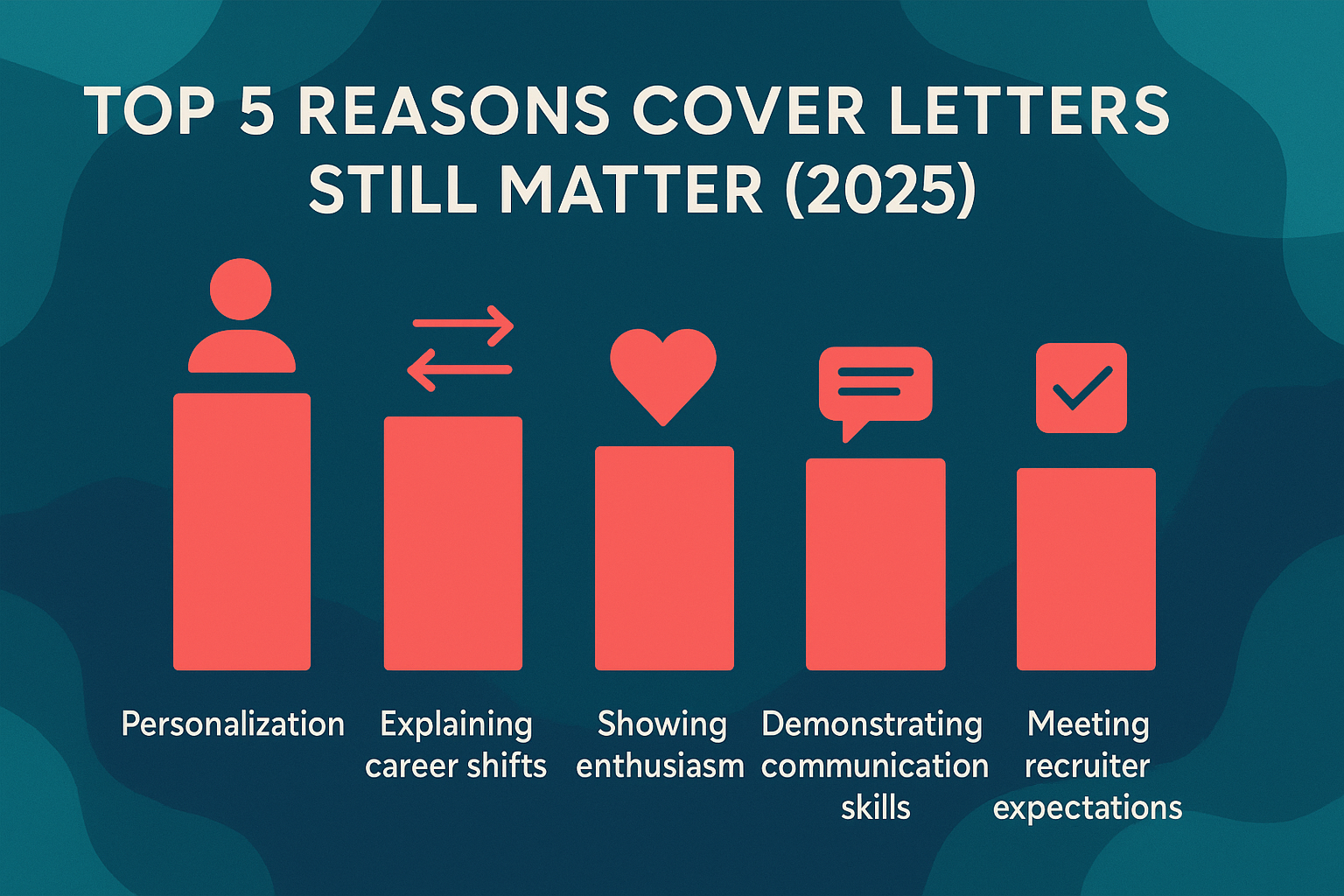
1. They Show You’re Serious
Many hiring managers still value the effort behind a personalized cover letter. It signals that you’re not just spamming applications—you’ve read the job description, understood the role, and have something meaningful to say. In competitive roles, this attention to detail can make a real difference.
💬 “When I see a tailored cover letter, it tells me this person actually wants this job—not just any job.”
— Hiring manager on Reddit Jobs
2. You Can Tell the Story Your Resume Can’t
Resumes are great at listing qualifications—but they’re bad at explaining why you want the job, how your past connects to the future, or what you learned from a career detour. A cover letter lets you fill in those blanks.
If you’re changing careers or re-entering the workforce, your resume might raise questions. A well-written letter answers them—before the recruiter even asks.
3. It’s an Opportunity to Stand Out
In a sea of similar resumes, a thoughtful cover letter can bring personality to your application. It’s where your voice comes through—and where you can connect emotionally with the reader.
Especially in roles that require communication, creativity, or writing skills, the letter becomes a subtle sample of your work.
➡️ Recommended Read: How to Write Cover Letter with ChatGPT
4. Some Recruiters Still Expect It
Even if a cover letter isn’t explicitly required, omitting it might hurt your chances. According to surveys and recruiter comments on platforms like Reddit and Indeed, a missing letter can feel like a red flag—especially for senior or client-facing positions.
When You Can (Sometimes) Skip a Cover Letter
While a well-written cover letter can elevate your application, there are scenarios where skipping it won’t hurt your chances—or might even be the smarter choice.
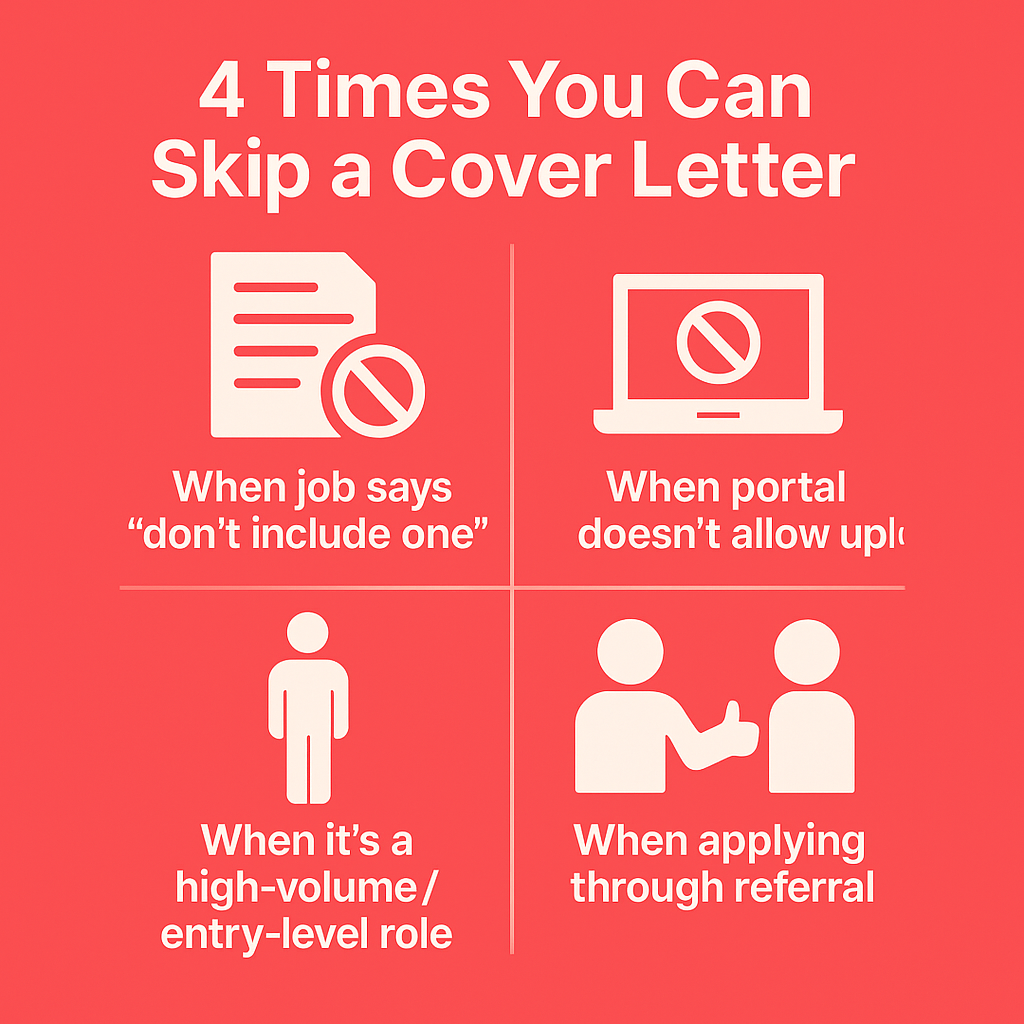
1. The Job Description Says “No Cover Letter”
Some job postings explicitly mention that a cover letter isn’t required—or even discourage it. In those cases, sending one anyway may seem like you didn’t read the instructions, which can work against you.
Always follow directions. If the company says “resume only,” trust that.
2. There’s No Option to Upload One
Some online job portals don’t allow space to upload a cover letter, or they bury the option several clicks deep. If there’s no clear way to include it, it’s usually safe to skip—especially if the company hasn’t asked for it.
➡️ Pro Tip: If you’re emailing your application, you can always paste a brief, personalized note in the body of the email. It’s like a mini-cover letter without the formality.
3. It’s a High-Volume, Low-Personalization Role
If you’re applying for entry-level roles, hourly positions, or gigs where hundreds of people apply through platforms like Indeed or LinkedIn Easy Apply, cover letters aren’t always expected.
That said—if you really want the job or the role to align with your long-term goals, it’s still worth including one to stand out.
4. You’re Applying Through an Internal Referral
When someone inside the company has recommended you and is handing off your resume directly to a hiring manager or recruiter, a cover letter may be unnecessary. Your referrer acts as your endorsement.
Still, if the role is competitive or senior, a concise and thoughtful cover letter can further reinforce your value.
How to Write a High-Impact Cover Letter (Even in 2025)
If you’ve decided that submitting a cover letter is the right move—great! Now the challenge is making it count. In today’s hiring landscape, a generic, templated cover letter just won’t cut it. What you need is a high-impact, modern, and personalized message that speaks directly to the employer.
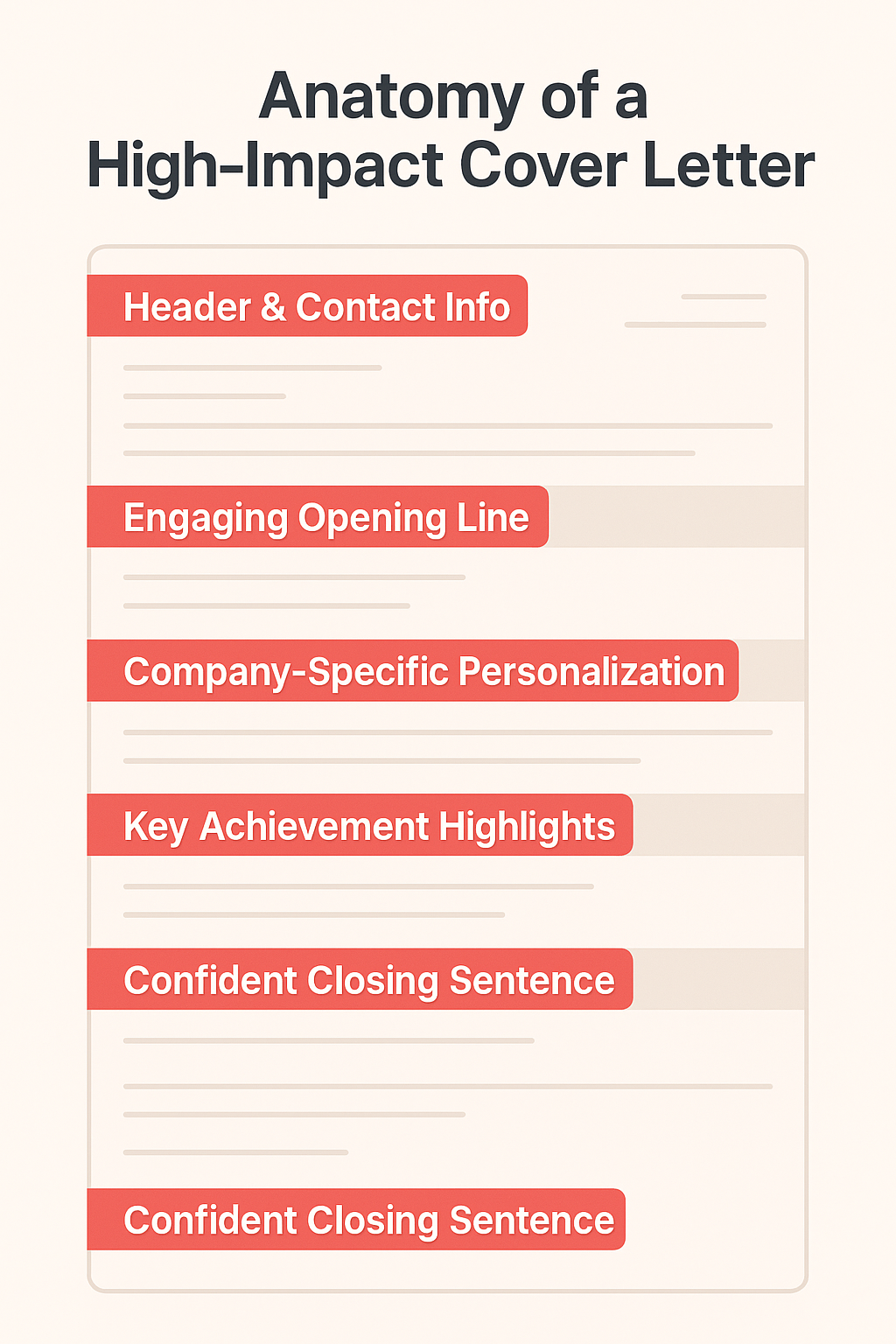
Here’s how to do it:
1. Start Strong with a Compelling Opening
Avoid the classic “I am writing to apply for…” line. Instead, open with something that grabs attention:
“As a digital marketer who increased SEO traffic by 400% in six months, I was immediately drawn to your growth-driven culture.”
Use your first sentence to connect your achievements or interests with what the company values.
2. Tailor It to the Job Description
Hiring managers can spot a copy-paste job in seconds. Show you’ve done your homework by referencing the company’s mission, recent work, or specific skills listed in the job post. Then explain how your background aligns.
Think of this as the “why you + why them” formula.
3. Highlight 1–2 Key Accomplishments
Don’t rehash your entire resume. Instead, pick one or two achievements that directly relate to the role—and quantify them if you can.
“In my previous role, I led a team that reduced customer churn by 28% in under a year.”
4. Keep It Human and Conversational
A good cover letter sounds like a real person wrote it—not a corporate robot. It’s okay to let your personality show, especially if you’re applying to a company that values authenticity, creativity, or customer-facing skills.
5. End with Confidence (Not Desperation)
Wrap up with a sentence that invites conversation, shows appreciation, and reiterates your enthusiasm.
“I’d welcome the chance to discuss how my background in UX design could help elevate your customer experience at [Company Name].”
Real Recruiter Opinions: Do They Actually Read Cover Letters?
Let’s address the big question that job seekers everywhere are asking:
“Do recruiters even read cover letters anymore?”
The answer? It depends. But in many cases—yes, they do.
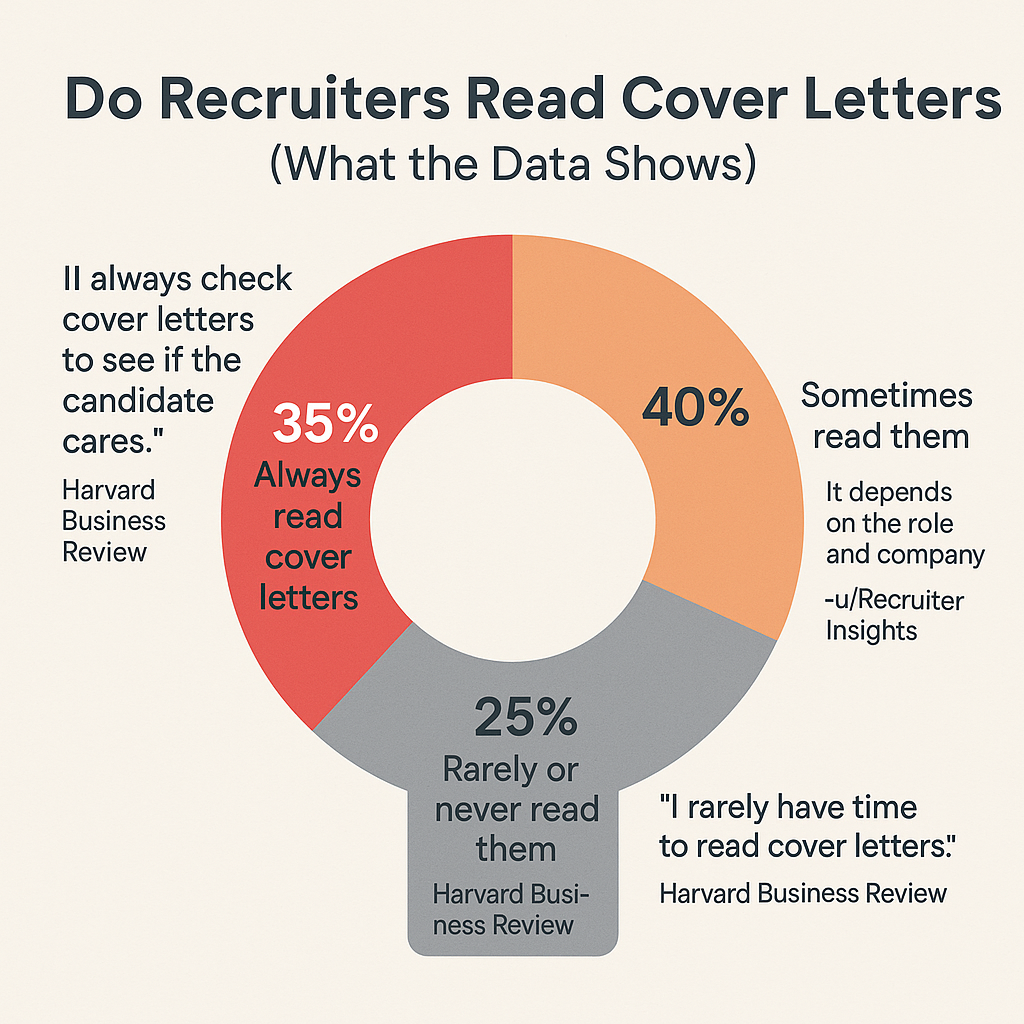
What Recruiters Are Saying
On platforms like Reddit and Quora, where hiring managers openly share their experiences, the consensus is clear:
💬 “If a candidate doesn’t send a cover letter, I don’t hold it against them. But when they do—and it’s good—I’m more inclined to call them in.”
— Recruiter on r/jobs
💬 “For client-facing or communication-heavy roles, I want to see how they write. A cover letter tells me how they think.”
— HR Manager on Quora
Recruiters typically fall into three camps:
- Those who always read cover letters – especially for roles where communication, motivation, or critical thinking is key.
- Those who read them if they’re on the fence – a strong letter can tip the balance in your favor.
- Those who ignore them completely – often in fast-paced industries or high-volume hiring.
What the Research Says
✅ According to a study by ResumeLab, 83% of hiring decision-makers say cover letters are important, and 74% say they prefer to receive one—even if optional.
✅ A Harvard Business Review article published in 2025 notes that personalized cover letters are still one of the strongest predictors of interview callbacks, especially in white-collar and hybrid roles.
When They Definitely Read It:
- For senior roles or leadership positions
- When explaining something unusual (e.g. a career gap or industry switch)
- If your resume doesn’t check every box, but your passion and potential shine through
Do You Need a Cover Letter for Every Job? (Full Breakdown by Job Type)
You’ve probably asked yourself at some point:
“Do I really need to write a new cover letter every single time?”
The short answer? Not always.
But the full answer depends on what kind of job you’re applying for, how competitive it is, and how formal the hiring process is.
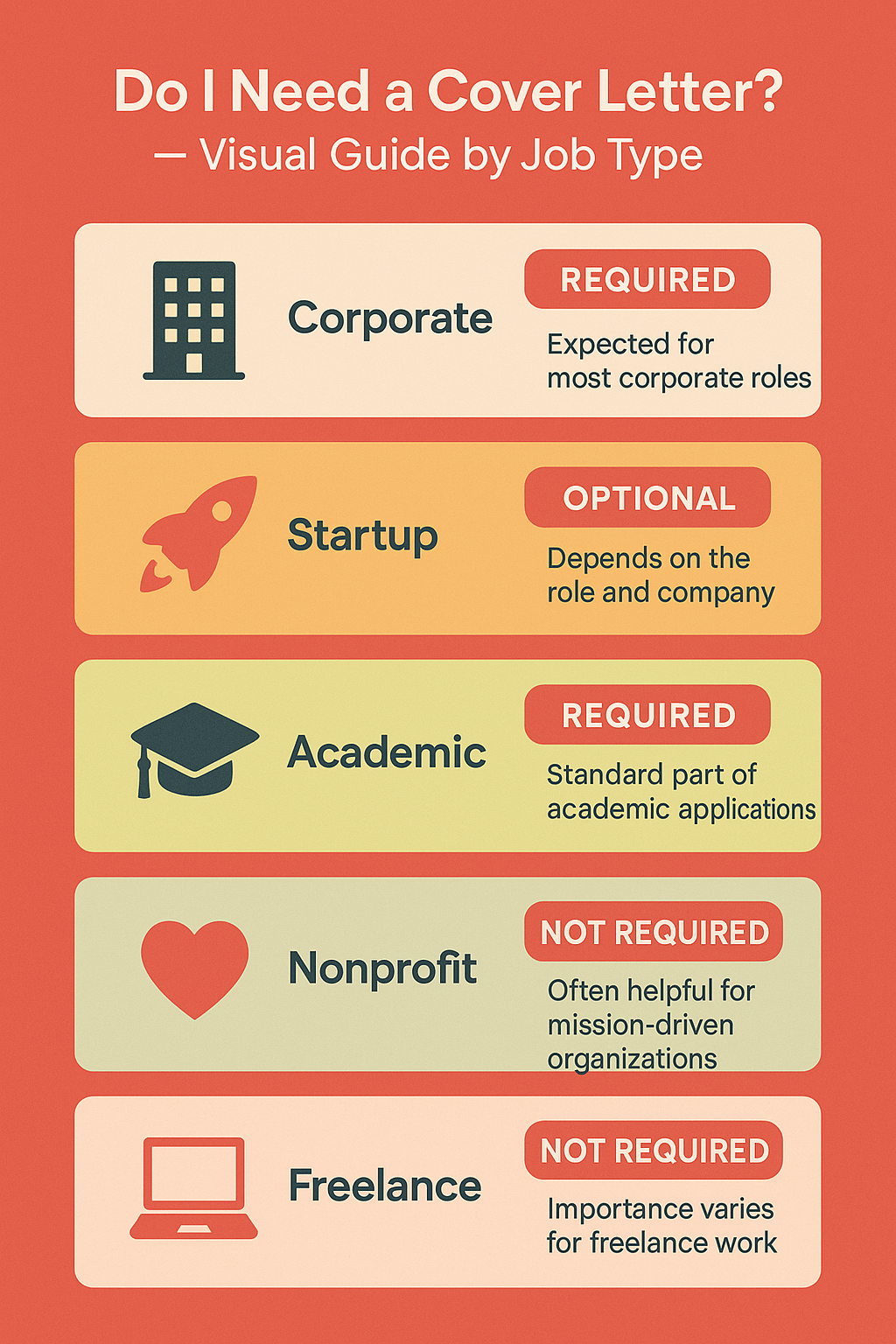
Let’s break it down:
🧑💼 Full-Time Corporate Jobs
✅ Yes, cover letter recommended
If you’re applying to mid- or senior-level roles in tech, finance, marketing, HR, or management—especially in large companies—a cover letter helps showcase your strategic thinking, intent, and communication skills.
🔗 Writing a Corporate Cover Letter That Works
🛍️ Part-Time or Retail Positions
🟡 Optional—but could help you stand out
Most part-time or hourly jobs don’t require a cover letter. However, if you’re aiming for a role in management or want to show initiative, a short, personalized letter could make a difference.
🧑🎓 Internships and Entry-Level Roles
✅ Strongly recommended
Hiring managers often use the cover letter to assess your motivation and soft skills—especially if you have little or no experience. It’s your chance to prove your potential.
🔗 Entry-Level Cover Letter Template with No Experience
🔁 Internal Job Postings
✅ Yes, and make it specific
When applying for a promotion or lateral move within your company, a cover letter helps communicate why you want the change—and how you’re already a cultural fit.
🔗 Cover Letter for Internal Positions: Tips & Template
👩🎨 Creative or Freelance Gigs
🟡 Depends on the client
Creative industries like design, content, or filmmaking often prefer portfolios over cover letters—but a short, impactful letter can still convey passion and context that your work alone might not.
⚙️ Tech & Engineering Roles
🟡 Optional, but valuable
Many tech recruiters focus on skills and GitHub links—but a solid letter could help highlight soft skills, product mindset, and career intent.
🔗 Cover Letter for Tech Roles in 2025
📍 Government & Nonprofits
✅ Yes, usually required
In these sectors, cover letters are often mandatory and part of a formal application process. They’re used to assess mission alignment and communication ability.
🔗 How to Write a Government Cover Letter
Frequently Asked Questions (FAQs)
Still not sure if a cover letter is worth your time? You’re not alone. Here are the most searched questions about cover letters in 2025—answered clearly and honestly.
❓ Is it unprofessional to not have a cover letter?
Not always—but it depends.
If the job posting asks for one, skipping it can seem careless. For competitive or senior roles, not including a cover letter might signal a lack of effort.
However, for entry-level or volume-based jobs (think food service, delivery, or warehouse roles), it’s generally acceptable to skip.
❓ What happens if I don’t send a cover letter?
In many cases: nothing.
You might still get the interview—especially if your resume shines. But in borderline situations, a good cover letter could be the deciding factor between getting ignored or getting called back.
❓ Is it mandatory to write a cover letter?
No, not usually.
But some industries and government positions do make it a requirement. Always read the job description carefully. If it says “attach cover letter,” consider it mandatory.
❓ Is a cover letter necessary anymore?
Yes—but selectively.
While not every recruiter reads them, many still value cover letters, especially when assessing soft skills, intent, and fit for the company culture.
❓ Is it OK to skip the cover letter?
Only if:
- The job post says it’s optional
- There’s no upload field
- You’re applying via referral or internal system
But if you’re applying cold, especially to a job you really want, skipping it may cost you a chance to stand out.
❓ Is a cover letter necessary for a CV?
Technically, they’re separate.
Your CV outlines your qualifications and work history. Your cover letter explains why you’re the right person for the role.
They complement each other—and using both is considered best practice in many countries, especially in Europe.
❓ Are cover letters still a thing in 2025?
Yes, but they’ve evolved.
Instead of being stiff and formal, cover letters in 2025 are shorter, sharper, and more conversational. They focus more on value than formality.
❓ Do I need a cover letter for any job?
No. But for jobs that require communication, leadership, or client interaction, a well-written letter can tip the scale in your favor.
❓ Is a cover letter necessary for a part-time job?
Not usually, unless:
- The company requests it
- You want to show initiative
- It’s a competitive or skilled role (like tutoring or retail management)
🔗 Cover Letter for Business Partner Manager
❓ Do I need a cover letter for an internal job posting?
Yes—especially if:
- You’re aiming for a promotion
- You’re switching departments
- The company requires formal application materials
It shows thoughtfulness and professionalism.
🔗 Internal Job Cover Letter Template
Final Verdict: So… Is a Cover Letter Still Necessary?
In 2025, cover letters aren’t extinct—but they are evolving. While not always required, they can be a powerful tool for:
✅ Standing out in a saturated job market
✅ Proving your intent and personality
✅ Giving context that your resume can’t convey
✅ Impressing recruiters who do read them
The key? Don’t just write a cover letter—write one that matters. Tailor it. Make it engaging. Use it to tell the story your resume doesn’t.
TL;DR Summary
| Situation | Is a Cover Letter Necessary? |
|---|---|
| Entry-level job | ✅ Recommended |
| Senior/Corporate role | ✅ Highly recommended |
| Part-time job | 🟡 Optional |
| Freelance/Creative | 🟡 Depends |
| Internal job posting | ✅ Yes |
| Tech/Engineering | 🟡 Optional but smart |
| Government/Nonprofit | ✅ Often required |

